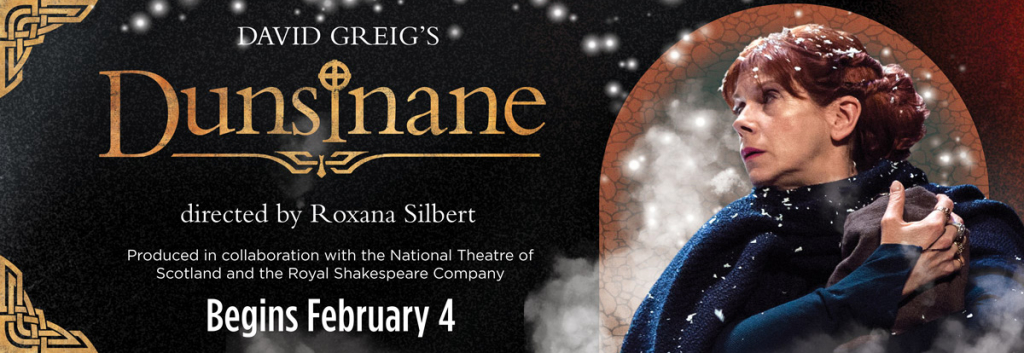Be very, very careful about the way in which you hear and use words. It can be the key to understanding victory or misinterpreting failure in battle. And a battle of epic proportions is what the Shakespeare Theatre Company in Washington DC has set out to display with their national premier of the National Theatre of Scotland and The Royal Shakespeare Company’s production of Dunsinane. A thrillingly dramatic sequel to one of the Bard’s bloodiest tragedies, this play written by David Greig, clips into the tail-end of the action that concludes Macbeth. The word sequel often comes with an ominous foreboding of “bad idea” attached to it, but this ruthlessly brilliant penning of the aftermath of the Scottish Tragedy, wherein Lady Macbeth has survived to claim the throne from Malcolm, decimates these negative stereotypes in one fell swoop of dramatic glory. Directed by Roxana Silbert, the production is a riveting take on the ceaseless war England wages upon Scotland and vice versa all in the name of peace.
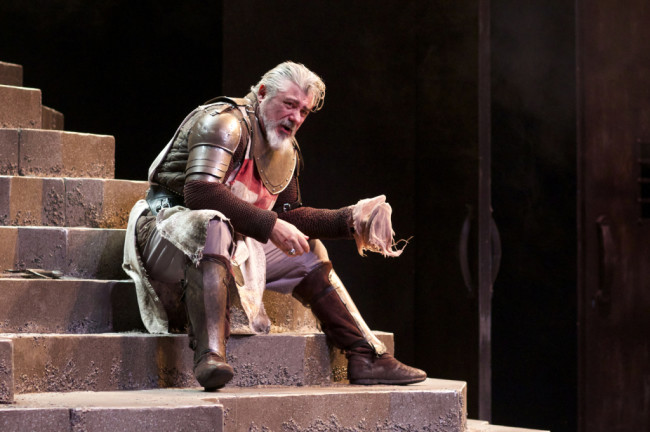
Playwright David Greig pens a vivid piece of theatre with Dunsinane; the twisted plot elements, the dark humor, the striking trauma of a Shakespearean tragedy; all of it captured in this work without the heavy meter or convoluted jargon of the Bard. Greig’s work is thoughtful as well as thought-provoking; a sub-textual layering of current global war politics nestled into the text as a tertiary agenda behind the primary and secondary messages. His characterization of Lady Macbeth is one of the most enigmatic, portraying her as both human and immortal; a woman and a witch. His construction of Malcolm makes the late Macbeth look almost saintly by comparison. The depth with which he explores these characters and furthers the examination of parental to child relationships is evocative and rewarding.
The word striking comes to mind, followed quickly by abrupt when trying to capture the world of the play in words. Descriptions do not do the snappy pace, the exceptional setting, and incredible atmospheric design elements of lighting and sound anywhere near the amount of justice that they deserve in this production. Led by Director Roxana Silbert, the show pushes forward without the notice of time in the audience’s eye. The succinct fashion in which scenes jarringly rupture from one to the other jolts the bones of the watcher and keeps the hour far from the forefront of the mind. The use of the magnificent, albeit barren, set is the sharp mark of Silbert’s understanding of spatial relationships and how to create dynamic tension simply by placing an actor or a group of actors closer or farther away from one another.
Credited as Designer, responsible for the aesthetic of the production in both set and costume conceptualization, Robert Innes Hopkins opens the world of historic and bloodied Scotland to the Washington DC audience. The stark stone steps with the Celtic knotted cross at its crest serve as both interior and exterior setting without question as to which scene is which. This barren landscape echoes the symbolic feeling of a settled kingdom; for a kingdom is only settled when everyone is dead. Hopkins’ costume work is remarkably simple and yet elegant; they are soldiers laying siege to a war-strewn countryside. The overall effect of these simplistic yet striking designs is the harrowing feeling that is diffused into the ether as the play progresses. Hopkins’ snowfall in the final scenes is a breathtaking effect that brings the play full circle; fire to burn away the tragedy and snow to wipe it clean and start anew.
Sound Designer and Composer Nick Powell works with Lighting Designer Chahine Yavroyan to complete the experience of a darkened Scottish world. The abrupt percussive sounds that conclude scenes strike an unsettled fear and sense of unease outward so that each scene unfolds on thin ice that could easily crack beneath its weight. The subtle shifts in Yavroyan’s work allows for distinguishing between interior and exterior scenes. It is Powell’s compositions that really strike home, particularly the hauntingly festive music featured just before the end of the first act; a true aural delight that weaves the tale of the play among its notes.
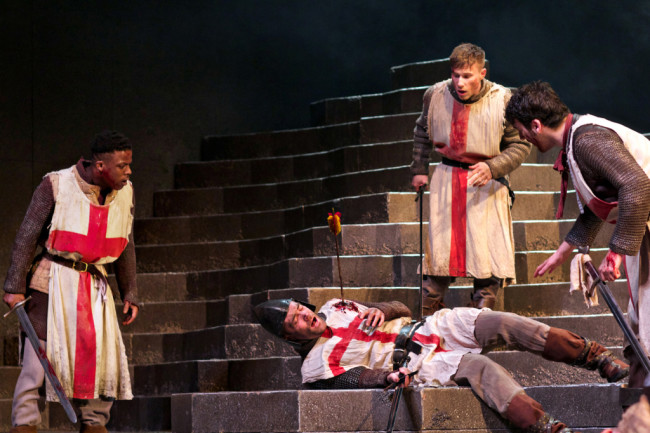
Tom Gill as The Boy Soldier, Arthur McBain as English Soldier KPO Photo
Acting a Shakespearean sequel is not simply speaking the speech and bustling about on the stage. Voice Coach Stephen Kemble and Movement Director Anna Morrissey, in conjunction with Fight Director Terry King, ensure that the authenticity of this play’s sound and movement resonate fully with the audience. Kemble’s focus on ensuring that despite thick natural Scottish accents, particularly on the actress playing Gruach (Lady Macbeth), that the words are cleanly and clearly articulated and understood. Kemble also ensures the authenticity of the hearty English sound from Siward’s character and that indistinguishable blend of Malcolm’s versatile speech sound. Morrissey makes the soldiers look like actual warriors whether they are storming the castle or shooting target practice. Combined with King’s tight and precise fighting efforts, the play has a vigorous visual appeal to match the gripping plotline.
The company features a great deal of standout cameo performances. Toyin Omari-Kinch, Alex Mann, and Arthur McBain all serve as soldiers of note in the show. Omari-Kinch as Eric the archer gets into a highly amusing debate of lust with Arthur McBain, and Mann, playing as Egham, wins over the hearts of the audience with his character’s duplicitous duality in allegiances. Macduff (Keith Fleming) is worth noting as well for his gruff nature, staunch attitude toward war, and heartfelt confession early on in the performance.
The Boy Soldier (Tom Gill) is the narrative connecting bridge from the story to the audience. Gill’s narrations serve as a partial framework and lens for the audience to view the unfolding of the tale as he narrates in letter format his experience with this war. Delivered with curios naivette and a tongue-in-cheek humor, Gill is a refreshing ray of hope across the tempestuous sea of war and turmoil that clashes through the production. His innocence and basic view of the world, even as it is at war around him, is a vibrant reminder that there is more to life than war and peace; there are sons and mothers and families in the world as well.
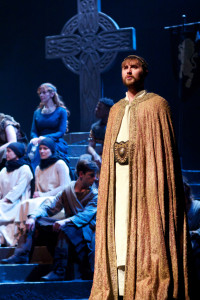
Malcolm (Ewan Donald) is little more than a whinging piss-ant bent on keeping the kingdom for himself, regardless the cost, but naturally without wanting to put any of the work or effort into doing so. Donald embraces the soppy, albeit cruel, side of the character as easily as he does the ruthless depths to which the character’s soul knows no bounds. While outwardly annoying, his reedy voice and deliberately succinct cadence adding to that factor exponentially, Donald’s inward portrayal is that of a more baser evil. Lazy on the surface, driven by greed and power from a deeper twist in his core. There is little to like about Donald’s character save for how exceptionally well he makes Malcolm the villainous antagonist to Siward and the whole of Scotland. His kingly acceptance speech is worth noting for the levels of revulsion it stirs among those listening.
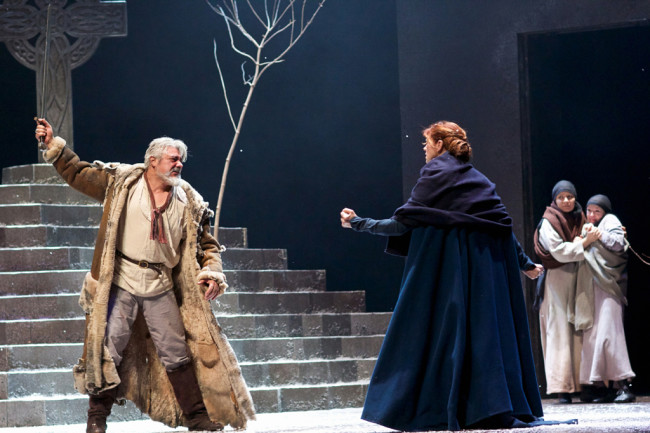
The play, much like all Shakespearean tragedies, has a solid romantic arc, however surprising it may be. Falling to Siward (Darrell D’Silva) and Gruach (Siobhan Redmond.) These two performers take their characters which are as different as water and oil— and between the two they vacillate from one extreme to the other never settling for more than a moment’s time in any one state of existing— and draw them together as forcefully as they tear them apart. The burgeoning courtship that blossoms amid the detritus and fallout of slaughter, seizure, and war; the daring of optimism and the shattering of dreams, the result of which becomes a raging typhoon that drowns the entire second act in an emotional tidal wave.
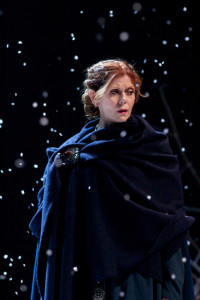
D’Silva and Redmond are bold and dynamic in their portrayals, it seems hardly fitting to discuss one without the other for even when they are on stage apart from one another their character’s influence the other’s story so intently that their presence is palpable even in physical absence. D’Silva juxtaposes his good nature and peaceful attempt against a violent storm of rage in the second act; fury the likes of which no man could be thought to possess. Redmond throws it right back at him in a curse of speech near the end of the performance. Both share a vulnerability that transcends not only their own character but every human character in the performance.
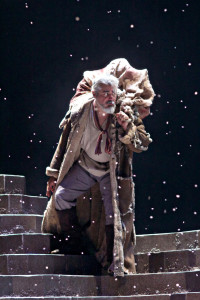
Striking actors, both D’Silva and Redmond adapt these Shakespearean icons to their own unique portrayals. The presence that they each command; be it alone on the stage in moments of pensive existence, together in a time of tentative hope or blasting confusing hatred, grips the audience to the edge of their seat and holds them with bated breath as every action unfolds. D’Silva and Redmond both embody the sea, which serves as an overarching metaphor for the state of Scotland, rarely at peace. Their dynamic and at times explosive portrayals are what drive the production.
It is rare that a sequel lives up to the greatness of the original work that it follows. Dunsinane is that rarest of cases in that it does exactly that in a fashion most satisfying. It is a limited engagement run and should be experienced for all of its glory.
Running Time: 2 hours and 35 minutes with one intermission
Dunsinane plays through February 21, 2015 at Shakespeare Theatre Company in Sidney Harman Hall— 610 F Street NW in Washington, DC. For tickets call the box office at (202) 547-1122 or purchase them online.

